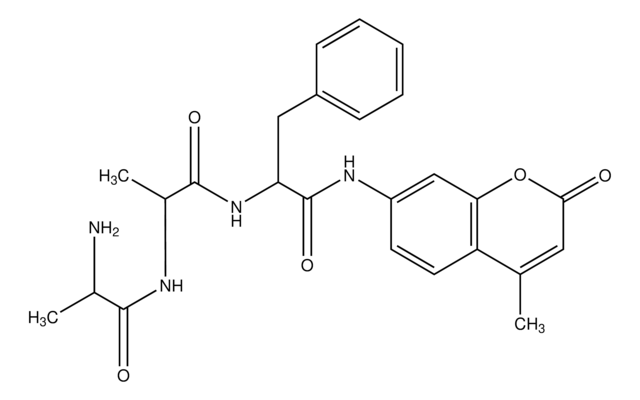B4153
Boc-Gln-Ala-Arg-7-amido-4-methylcoumarin hydrochloride
~95%
Synonym(s):
Boc-Gln-Ala-Arg-AMC hydrochloride, Boc-Gln-Ala-Arg-Mca hydrochloride
About This Item
Recommended Products
Assay
~95%
Quality Level
form
powder
solubility
methanol: 50 mg/mL, clear, colorless
storage temp.
−20°C
SMILES string
CC(NC(=O)C(CCC(N)=O)NC(=O)OC(C)(C)C)C(=O)NC(CCCNC(N)=N)C(=O)Nc1ccc2C(C)=CC(=O)Oc2c1
InChI
1S/C29H42N8O8/c1-15-13-23(39)44-21-14-17(8-9-18(15)21)35-26(42)19(7-6-12-33-27(31)32)36-24(40)16(2)34-25(41)20(10-11-22(30)38)37-28(43)45-29(3,4)5/h8-9,13-14,16,19-20H,6-7,10-12H2,1-5H3,(H2,30,38)(H,34,41)(H,35,42)(H,36,40)(H,37,43)(H4,31,32,33)
InChI key
LQSLBVXESNRILG-UHFFFAOYSA-N
General description
Application
Packaging
Substrates
Storage Class Code
11 - Combustible Solids
WGK
WGK 3
Flash Point(F)
Not applicable
Flash Point(C)
Not applicable
Personal Protective Equipment
Certificates of Analysis (COA)
Search for Certificates of Analysis (COA) by entering the products Lot/Batch Number. Lot and Batch Numbers can be found on a product’s label following the words ‘Lot’ or ‘Batch’.
Already Own This Product?
Find documentation for the products that you have recently purchased in the Document Library.
Our team of scientists has experience in all areas of research including Life Science, Material Science, Chemical Synthesis, Chromatography, Analytical and many others.
Contact Technical Service





